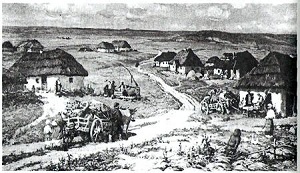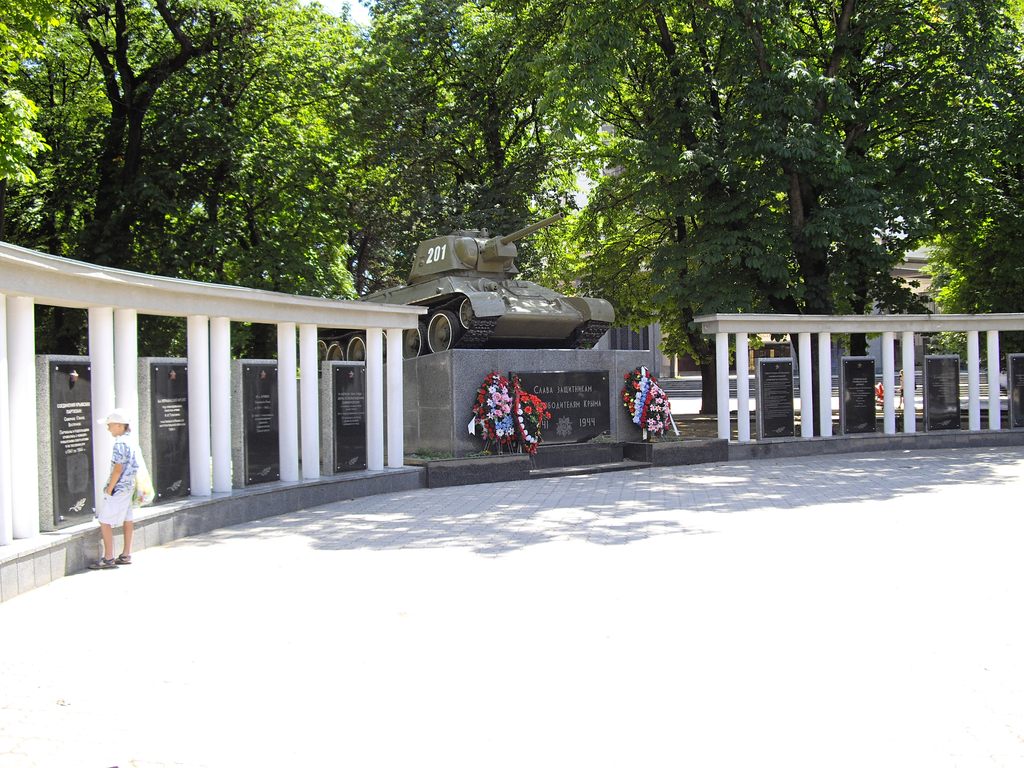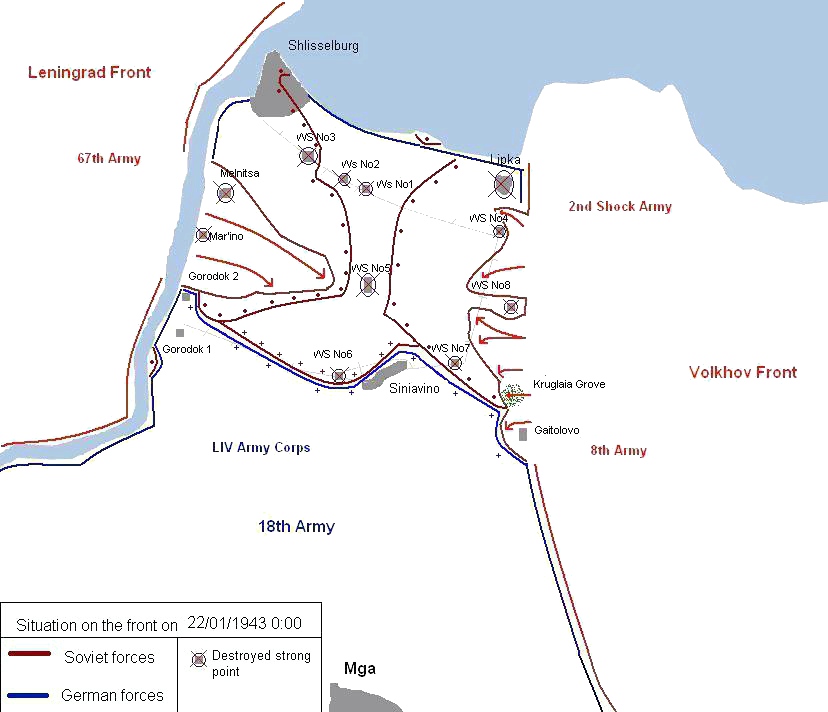|
Boris Rodos
Boris Veniaminovich Rodos (russian: Борис Вениаминович Родос; 22 June 1905 in Melitopol 20 April 1956 in Butyrka prison, Moscow) was an officer of the OGPU, colonel of the NKVD and Ministry of State Security, deputy head of the Investigative Department of the Main Board of State Security and People's Commissariat of State Security who was notorious for torturing prisoners during interrogations. His victims came from a variety of high-ranking communists and military officials who fell victim to purges, including Yakov Smushkevich, Grigory Shtern, and Aleksandr Loktionov. Biography Rodos was the son of a Jewish tailor from Melitopol, Russian Empire. Reputedly, he left school at the age of 11, possibly because his education was disrupted by the February Revolution. As an office worker in Melitopol, he joined Komsomol (the Young Communist League) but was expelled in 1930 for attempted rape. He joined the Communist Party of the Soviet Union in 1931 and, around ... [...More Info...] [...Related Items...] OR: [Wikipedia] [Google] [Baidu] |
Melitopol
Melitopol ( uk, Меліто́поль, translit=Melitópol’, ; russian: Мелитополь; based on el, Μελιτόπολις - "honey city") is a List of cities in Ukraine, city and List of hromadas of Ukraine, municipality in Zaporizhzhia Oblast in southeastern Ukraine. Melitopol has been Russian occupation of Zaporizhzhia Oblast, occupied by Russia since March 2022. It is situated on the Molochna River, which flows through the eastern edge of the city into the Molochnyi Lyman estuary. Melitopol is the second-largest city in the oblast after Zaporizhzhia and serves as the administrative center of Melitopol Raion. As of January 2022 Melitopol's population was approximately Its population has since declined substantially due to the city's capture in the opening weeks of the 2022 Russian invasion of Ukraine. The city is located at the crossing of two major European highways: European route E58, E58 Vienna – Uzhhorod – Kyiv – Rostov-on-Don and European route E105, ... [...More Info...] [...Related Items...] OR: [Wikipedia] [Google] [Baidu] |
Vlas Chubar
Vlas Yakovlevich Chubar ( uk, Влас Якович Чубар; russian: Вла́с Я́ковлевич Чуба́рь) ( – 26 February 1939) was a Ukrainian Bolshevik revolutionary and a Soviet politician. Chubar was arrested during the Great Terror of 1937-38 and executed early in 1939. The top Communist Party official in Ukraine during the 1932-33 famine, Chubar was posthumously held culpable for those events by a Ukrainian court in 2010. Early career Chubar was from an ethnic Ukrainian peasant family. He was born in Fedorіvka, Yekaterinoslav Governorate, Russian Empire (now in Polohy Raion, Zaporizhzhia Oblast, Ukraine). His parents were illiterate peasants who owned a small plot of land. He was arrested and beaten by gendarmes for belonging to a revolutionary group when he was 13 years old. After leaving school, he worked as a roofer. Chubar became a Marxist revolutionary during the 1905 revolution and joined the Bolshevik faction of the Russian Social Democratic Lab ... [...More Info...] [...Related Items...] OR: [Wikipedia] [Google] [Baidu] |
1905 Births
Nineteen or 19 may refer to: * 19 (number), the natural number following 18 and preceding 20 * one of the years 19 BC, AD 19, 1919, 2019 Films * ''19'' (film), a 2001 Japanese film * ''Nineteen'' (film), a 1987 science fiction film Music * 19 (band), a Japanese pop music duo Albums * ''19'' (Adele album), 2008 * ''19'', a 2003 album by Alsou * ''19'', a 2006 album by Evan Yo * ''19'', a 2018 album by MHD * ''19'', one half of the double album ''63/19'' by Kool A.D. * ''Number Nineteen'', a 1971 album by American jazz pianist Mal Waldron * ''XIX'' (EP), a 2019 EP by 1the9 Songs * "19" (song), a 1985 song by British musician Paul Hardcastle. * "Nineteen", a song by Bad4Good from the 1992 album '' Refugee'' * "Nineteen", a song by Karma to Burn from the 2001 album ''Almost Heathen''. * "Nineteen" (song), a 2007 song by American singer Billy Ray Cyrus. * "Nineteen", a song by Tegan and Sara from the 2007 album '' The Con''. * "XIX" (song), a 2014 song by Slipk ... [...More Info...] [...Related Items...] OR: [Wikipedia] [Google] [Baidu] |
NKVD Officers
The People's Commissariat for Internal Affairs (russian: Наро́дный комиссариа́т вну́тренних дел, Naródnyy komissariát vnútrennikh del, ), abbreviated NKVD ( ), was the interior ministry of the Soviet Union. Established in 1917 as NKVD of the Russian Soviet Federative Socialist Republic, the agency was originally tasked with conducting regular police work and overseeing the country's prisons and labor camps. It was disbanded in 1930, with its functions being dispersed among other agencies, only to be reinstated as an all-union commissariat in 1934. The functions of the OGPU (the secret police organization) were transferred to the NKVD around the year 1930, giving it a monopoly over law enforcement activities that lasted until the end of World War II. During this period, the NKVD included both ordinary public order activities, and secret police activities. The NKVD is known for its role in political repression and for carrying out the Great Pu ... [...More Info...] [...Related Items...] OR: [Wikipedia] [Google] [Baidu] |
Tomsk
Tomsk ( rus, Томск, p=tomsk, sty, Түң-тора) is a city and the administrative center of Tomsk Oblast in Russia, located on the Tom River. Population: Founded in 1604, Tomsk is one of the oldest cities in Siberia. The city is a notable educational and scientific center with six state universities consisting of over 100,000 students, including Tomsk State University, the oldest university in Siberia. History Tomsk originated with a decree by Tsar Boris Godunov in 1604 after , the Tatar duke of , asked for the Tsar's protection against Kirghiz bandits. The Tsar sent 200 Cossacks under the command of and Gavriil Ivanovich Pisemsky to construct a fortress on the bank of the Tom River, overlooking what would become the city of Tomsk. Toian ceded the land for the fortress to the Tsar. [...More Info...] [...Related Items...] OR: [Wikipedia] [Google] [Baidu] |
On The Cult Of Personality And Its Consequences
"On the Cult of Personality and Its Consequences" (russian: «О культе личности и его последствиях», «''O kul'te lichnosti i yego posledstviyakh''»), popularly known as the "Secret Speech" (russian: секретный доклад, ), was a report by Soviet leader Nikita Khrushchev, First Secretary of the Communist Party of the Soviet Union, made to the 20th Congress of the Communist Party of the Soviet Union on 25 February 1956. Khrushchev's speech was sharply critical of the rule of the deceased General Secretary and Premier Joseph Stalin, particularly with respect to the purges which had especially marked the last years of the 1930s. Khrushchev charged Stalin with having fostered a leadership cult of personality despite ostensibly maintaining support for the ideals of communism. The speech was leaked to the West by the Israeli intelligence agency Shin Bet, which received it from the Polish-Jewish journalist Wiktor Grajewski. The speech was ... [...More Info...] [...Related Items...] OR: [Wikipedia] [Google] [Baidu] |
Nikita Khrushchev
Nikita Sergeyevich Khrushchev (– 11 September 1971) was the First Secretary of the Communist Party of the Soviet Union from 1953 to 1964 and chairman of the country's Council of Ministers from 1958 to 1964. During his rule, Khrushchev stunned the communist world with his denunciation of his predecessor Joseph Stalin's crimes, and embarked on a policy of de-Stalinization with his key ally Anastas Mikoyan. He sponsored the early Soviet space program, and enactment of moderate reforms in domestic policy. After some false starts, and a narrowly avoided nuclear war over Cuba, he conducted successful negotiations with the United States to reduce Cold War tensions. In 1964, the Kremlin leadership stripped him of power, replacing him with Leonid Brezhnev as First Secretary and Alexei Kosygin as Premier. Khrushchev was born in 1894 in a village in western Russia. He was employed as a metal worker during his youth, and he was a political commissar during the Russian Civil Wa ... [...More Info...] [...Related Items...] OR: [Wikipedia] [Google] [Baidu] |
Simferopol
Simferopol () is the second-largest city in the Crimea, Crimean Peninsula. The city, along with the rest of Crimea, is internationally recognised as part of Ukraine, and is considered the capital of the Autonomous Republic of Crimea. However, it is under the ''de facto'' control of Russia, which Annexation of Crimea by the Russian Federation, annexed Crimea in 2014 and regards Simferopol as the capital of the Republic of Crimea. Simferopol is an important political, economic and transport hub of the peninsula, and serves as the administrative centre of both Simferopol Municipality and the surrounding Simferopol District. After the 1784 Annexation of Crimea by the Russian Empire, annexation of the Crimean Khanate by the Russian Empire, the Russian empress decreed the foundation of the city with the name Simferopol on the location of the Crimean Tatars, Crimean Tatar town of Aqmescit ("White Mosque"). The population was Etymologies The name Simferopol ( uk, Сімферо́ ... [...More Info...] [...Related Items...] OR: [Wikipedia] [Google] [Baidu] |
MGB (USSR)
The MGB (russian: МГБ), an initialism for ''Ministerstvo gosudarstvennoy bezopasnosti SSSR'' ( rus, Министе́рство госуда́рственной безопа́сности СССР, p=mʲɪnʲɪˈsʲtʲerstvə ɡəsʊˈdarstvʲɪn(ː)əj bʲɪzɐˈpasnəsʲtʲɪ ; translated in English as Ministry for State Security), was the name of the Soviet state security apparatus dealing with internal and external security issues: secret police duties, foreign and domestic intelligence and counterintelligence, etc. from 1946 to 1953. Origins of the MGB The MGB was just one of many incarnations of the Soviet State Security apparatus. After the revolution, the Bolsheviks relied on a strong political police or security force to support and control their regime. During the Russian Civil War, the Cheka were in power, relinquishing it to State Political Directorate (GPU) in 1922 after the fighting was over. The GPU was then renamed The People's Commissariat for Internal Affa ... [...More Info...] [...Related Items...] OR: [Wikipedia] [Google] [Baidu] |
Kirill Meretskov
Kirill Afanasievich Meretskov (russian: Кири́лл Афана́сьевич Мерецко́в; – 30 December 1968) was a Soviet military commander. Having joined the Communist Party in 1917, he served in the Red Army from 1920. During the Winter War of 1939–1940 against Finland, he had the task of penetrating the Mannerheim Line as commander of the 7th Army. He was awarded the title of Hero of the Soviet Union shortly afterwards. The NKVD arrested Meretskov at the start of invasion of the Soviet Union. Released two months later, he returned to command the 7th Army and later the Volkhov Front during the 1941–1944 siege of Leningrad. He commanded the Karelian Front from February 1944, notably the Petsamo–Kirkenes Offensive of October 1944. From April 1945 he was assigned to the Far East, where he commanded a front during the Soviet invasion of Japanese Manchuria. During the war he reached the rank of Marshal of the Soviet Union. [...More Info...] [...Related Items...] OR: [Wikipedia] [Google] [Baidu] |
Lviv
Lviv ( uk, Львів) is the largest city in western Ukraine, and the seventh-largest in Ukraine, with a population of . It serves as the administrative centre of Lviv Oblast and Lviv Raion, and is one of the main cultural centres of Ukraine. It was named in honour of Leo, the eldest son of Daniel, King of Ruthenia. Lviv emerged as the centre of the historical regions of Red Ruthenia and Galicia in the 14th century, superseding Halych, Chełm, Belz and Przemyśl. It was the capital of the Kingdom of Galicia–Volhynia from 1272 to 1349, when it was conquered by King Casimir III the Great of Poland. From 1434, it was the regional capital of the Ruthenian Voivodeship in the Kingdom of Poland. In 1772, after the First Partition of Poland, the city became the capital of the Habsburg Kingdom of Galicia and Lodomeria. In 1918, for a short time, it was the capital of the West Ukrainian People's Republic. Between the wars, the city was the centre of the Lwów Voivodeship in th ... [...More Info...] [...Related Items...] OR: [Wikipedia] [Google] [Baidu] |
Robert Eikhe
Robert Indrikovich Eikhe ( lv, Roberts Eihe (Ēķis), russian: Роберт Индрикович Эйхе; August 12, 1890 — February 4, 1940) was a Latvian Bolshevik and Soviet politician who was the provincial head of the Communist Party of the Soviet Union in Siberia during the forced collectivization of agriculture, until his arrest during the Great Purge. Early life Robert Eikhe's parents were farm labourers on an estate in Doblen County in what was then Courland province, in modern day Latvia. He left school at the age of 13 or 14 to become an apprentice in a locksmith's workshop and joined the Social Democracy of the Latvian Territory (which was closely aligned to the Bolsheviks) during the 1905 Revolution. Arrested in August 1907, he spent two months in prison. In February 1908, he was arrested with 18 others at an illegal meeting; he was released under police supervision after six months in prison. At the end of 1908 he emigrated to the UK. He was a stoker on a ... [...More Info...] [...Related Items...] OR: [Wikipedia] [Google] [Baidu] |









